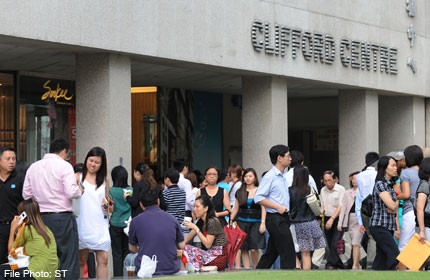Good news and bad, on Singapore earnings and spending

SINGAPORE - Restructuring can be a double-edged sword.
Wages are tipped to grow strongly this year, as curbs on foreign labour put pressure on the already-tight labour market.
But the phenomenon could also push prices up as businesses saddled with higher domestic costs - including costlier labour - will pass the buck to consumers. Cooked food may become more costly.
The Monetary Authority of Singapore (MAS) announced yesterday that overall wage growth is expected to stay above the historical average of 3.3 per cent this year and next.
This is due to a tight labour market, driven by a rise in labour demand and labour constraints across many sectors, MAS said.
As firms turn to hiring locals amid curbs on foreign-manpower growth, resident wages are also expected to rise, MAS said.
CIMB economist Song Seng Wun estimated that wages may grow by as much as 5 per cent, but the increase will not be uniform across all industries.
OCBC economist Selena Ling said high-skilled jobs and those in high demand "will benefit more".
"Previously, you could source for foreign talent in the finance or infocomm sector, for example, but the window is now narrowing," she added.
MAS also expects demand for professionals, managers, executives and technicians (PMETs) to pick up, as more jobs are created for them in industries such as community, social and personal services. Recent policies to tighten the inflow of foreign PMETs will also boost the hiring of residents, the authority said.
Mr Song said that, while the labour market is tighter due to foreign-hiring restrictions, businesses are still being formed because of strong demand from consumers.
MAS said inflation is expected to rise in the next few quarters, before tapering towards the end of next year.
Core inflation, which excludes car and housing prices, is expected to rise from 1.5-2 per cent this year to 2-3 per cent next year.
Ms Ling said: "A lot of high rentals and labour costs are starting to bubble through (to consumers), especially in the labour-intensive (industries)."
Singaporeans' favourite pastime of eating out may take a hit, as domestic food inflation is expected to rise from 2 per cent this year, to close to 3 per cent next year.
"While prices of non-cooked food should rise more slowly, given favourable projections of global crop harvests, cooked-food prices will face upward pressure from higher domestic costs," said MAS.
On the expected rise in inflation, Ms Ling said: "It is a short-term pain of not having foreign workers to fill jobs in the interim. But in the longer term, you restructure the economy...locals are paid more and are more productive."
adrianl@sph.com.sg

Get My Paper for more stories.